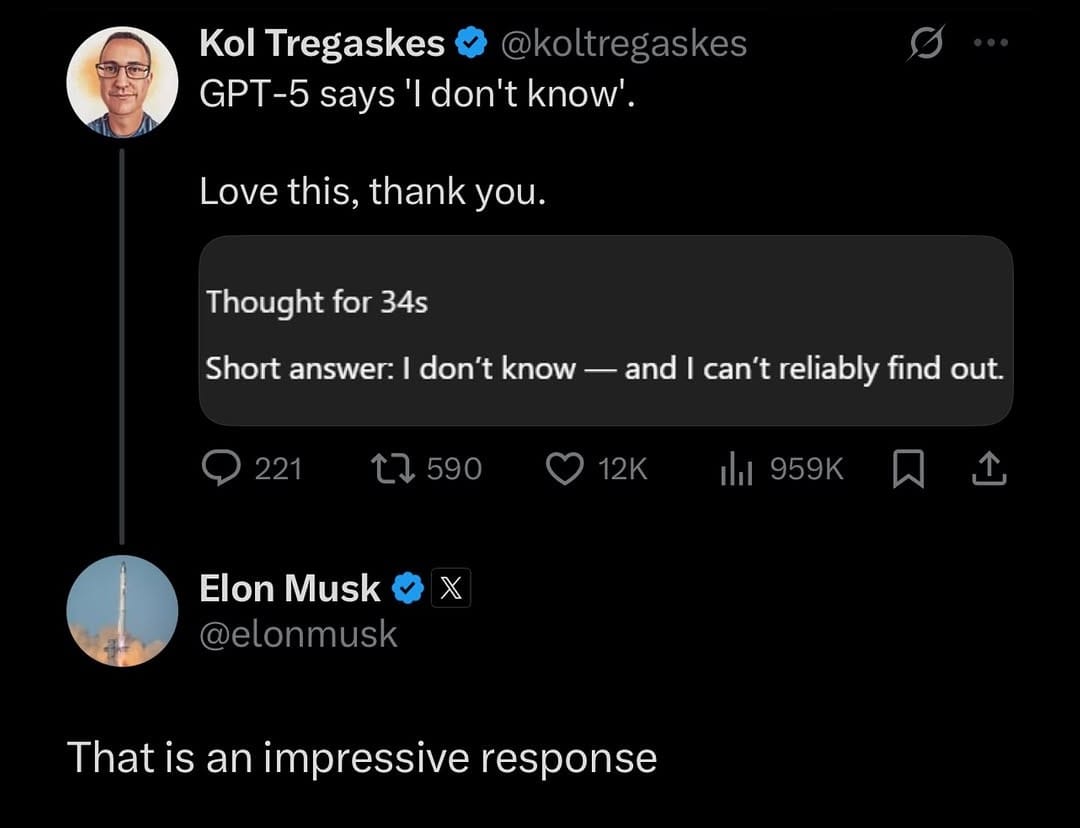Why "I Don't Know" Is One of the Most Impressive Things an AI Can Say

If I ask someone and the answer is "I don't know," my normal reaction would be one of disappointment. Especially if this someone is an all-knowing AI with billions of parameters trained on more data than I could ever process in my entire life. But here is why "I don't know" is one of the most important answers an LLM can give you.
Short answer: I dont know — and I cant reliably find out
Recently GPT-5 produced this answer after reasoning for a whole 34 seconds. Elon Musk himself called it an 'impressive response.'

When considering the challenges posed by AI hallucinations, where systems generate confident but incorrect information. This particular phrase stands out as surprisingly significant: "I don’t know." AI language models are designed to provide information and assist users in various contexts. However, they are also prone to hallucinations. Hallucinations occur when an AI generates content that is not based on factual data, leading to potential misinformation. These instances can range from minor inaccuracies to entirely fabricated claims, which can be detrimental in sensitive scenarios such as medical advice, legal guidance, or crisis situations.
The saying "I don’t know" serves as a reflective and responsible answer that highlights the limitations of AI. When an LLM chooses to respond with uncertainty rather than fabricate information, it acknowledges that it lacks sufficient data or confidence in providing a correct answer. This honesty is crucial for several reasons:
- Trust and Credibility: In an era filled with misinformation, trust is the cornerstone of user interaction with AI. If users receive inaccurate information, especially when the AI provides it with high confidence, it can lead to a loss of trust in the technology. By stating "I don’t know," LLMs preserve their reliability, encouraging users to seek out verified sources of information or consult experts.
- Encouraging Critical Thinking: By admitting uncertainty, AI encourages users not to passively accept information but to think critically about the content they're receiving. This prompts individuals to question, research, and engage more deeply with the topic, fostering a more informed society.
- Mitigating Harm: In scenarios where incorrect information could cause significant consequences—like medical or legal advice—an LLM that can say "I don’t know" can prevent harm. It steers users away from potential risks associated with following misguided advice, ensuring that individuals consult qualified professionals instead.
- Setting Realistic Expectations: By incorporating uncertainty into their responses, LLMs can help set realistic expectations about their capabilities. Users must understand that while AI can be a powerful tool, it is not infallible and has limitations. This understanding can lead to more effective use of the technology, where users can leverage the strengths of LLMs while remaining aware of their boundaries.
In conclusion, while the phrase "I don't know" may seem like a weakness, it is, in fact, a strength for AI language models. By embracing uncertainty, AI can enhance trust, encourage critical thinking, mitigate harm, and set realistic expectations. As we navigate the evolving relationship between humans and AI, fostering a culture of honesty in responses may serve as the key to a more responsible and effective integration of these powerful technologies into our lives. Reflect on the importance of what it means to know, and why, sometimes, not knowing is the more appropriate answer.




